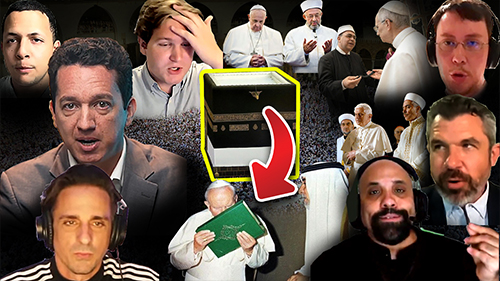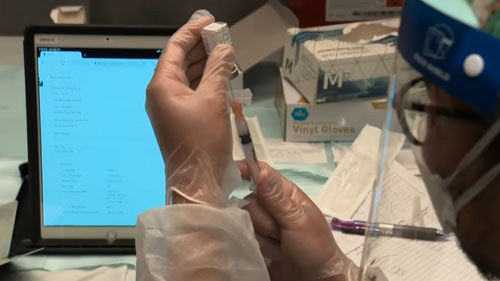| Recent Featured Videos and Articles | Eastern “Orthodoxy” Refuted | How To Avoid Sin | The Antichrist Identified! | What Fake Christians Get Wrong About Ephesians | Why So Many Can't Believe | “Magicians” Prove A Spiritual World Exists | Amazing Evidence For God | News Links |
| Vatican II “Catholic” Church Exposed | Steps To Convert | Outside The Church There Is No Salvation | E-Exchanges | The Holy Rosary | Padre Pio | Traditional Catholic Issues And Groups | Help Save Souls: Donate |  |









 " />
" /> " />
" /> " />
" /> " />
" /> " />
" />




Objection 14): Pope Honorius was condemned for heresy by a general council after his death, yet the Church does not consider him to have ceased to be pope, even though he was accused of heresy during his reign.
Answer: As we have already seen, it’s a dogmatic fact that a heretic cannot be the pope, since it’s an infallibly defined dogma that a heretic is not a member of the Catholic Church.
The case of Pope Honorius doesn’t prove that a heretic can be the pope. In condemning Pope Honorius as a heretic after his death, the III Council of Constantinople made no statement – nor has the Church ever made a statement – that he remained pope until his death.
The Church didn’t address the issue of whether Honorius lost the Papal Office after falling into heresy; it simply condemned him. (Honorius was also condemned by the Fourth Council of Constantinople and the Second Council of Nicea.) Since Honorius was a validly elected pope (which is why he is listed in the list of true popes), if he became a true heretic during his reign then he did lose the Papal Office; for, as even non-sedevacantists who make this argument admit, “heretics are not Catholics, and non-Catholics cannot be popes.”
Pope Honorius had been dead for more than 40 years when he was condemned by the III Council of Constantinople. Honorius had issued no dogmatic decrees, and only “reigned” for three and ½ years after the incident of heresy occurred. Hence, the question of whether he remained the pope and ruled the universal Church for the last three and ½ years of his thirteen-year pontificate wasn’t especially relevant to the faithful at the time.
Therefore, it is perfectly understandable that the Church didn’t issue any proclamation that Honorius lost his office because nothing was riding on the issue at the time, and it would have involved a major theological discussion and an entire can of worms that didn’t need to be opened.
Further, there still remains some confusion among people (including among Honorius’s successors) as to whether Pope Honorius had been a heretic or merely guilty of failing to stamp out heresy or whether he had been completely misunderstood, as The Catholic Encyclopedia of 1907 states. Certain scholars who have even studied the question in great detail remain unconvinced that Honorius was condemned as a true heretic by the III Council of Constantinople. Their argument rests in the fact that Pope St. Agatho, who was alive during the council, died before it was over. Since a council’s decrees only possess the authority which are given to them in the confirmation by the pope, they argue that Pope St. Leo II, the pope who actually confirmed the council, only confirmed the condemnation of Honorius in the sense that he failed to stamp out heresy, and therefore allowed the faith to be polluted. This confusion is surely why we see that St. Francis De Sales says what he says (see below) about Honorius.
In order to further differentiate the case of Honorius from the Vatican II antipopes, it’s important to point out that the lapse of Pope Honorius was almost completely unknown during his reign and for years after his reign. Honorius’s two letters which favored the monothelite heresy (written in 634) were letters to Sergius, the Patriarch of Constantinople. These letters were not only almost completely unknown at the time, but were also misunderstood by a pope who reigned just after Honorius.
For instance, Pope John IV (640-643), who was the second pope to reign after Pope Honorius, defended Honorius from any charge of heresy. Pope John IV was convinced that Honorius had not taught the monothelite heresy (that Christ has only one will), but that Honorius merely emphasized that Our Lord doesn’t have two contrary wills.
With these facts in mind, one can see: 1) the case of Pope Honorius doesn’t prove that heretics can be popes, since the Church has never declared that he remained the pope after his lapse; and 2) the facts of the case of Pope Honorius are drastically different from the case of the Vatican II antipopes, since Honorius’s two letters containing heresy were almost completely unknown at the time, and were even misunderstood by popes who succeeded him. To compare Pope Honorius’s two letters to the acts and statements of the manifest heretics Paul VI, John Paul II and Benedict XVI is like comparing a grain of sand to the seashore.
Finally, if you want further confirmation that heretics ipso facto cease to be popes, and that the case of Pope Honorius provides no evidence to the contrary, you don’t have to take our word for it.
In the same paragraph in which St. Francis De Sales (Doctor of the Church) mentions Pope Honorius, he states unequivocally that a pope who would become a heretic would cease to be pope. St. Francis De Sales wasn’t sure if Pope Honorius was a heretic or merely failed to stamp out heresy; but, whatever it was, St. Francis knew the case of Honorius didn’t affect the truth that heretics cannot be popes.
St. Robert Bellarmine and St. Alphonsus were also familiar with the case of Pope Honorius. His case didn’t cause them to hesitate in declaring:
With these facts in mind, we can see that the argument from Honorius doesn’t prove anything for the non-sedevacantist; but rather it reminds us of the Doctors of the Church who, while recalling his case, simultaneously declared that heretics cannot be popes.
See other Answers to the Most Common Objections Against Sedevacantism
[1] Decrees of the Ecumenical Councils, Vol. 1, p. 578; Denzinger 714.
[2] Decrees of the Ecumenical Councils, Vol. 1, pp. 125-126.
[3] Denzinger 253.
[4] St. Francis De Sales, The Catholic Controversy, pp. 305-306.
[5] Oeuvres Complètes, 9:232.
Sign up for our free e-mail list to see future vaticancatholic.com videos and articles.
Recent Content
^